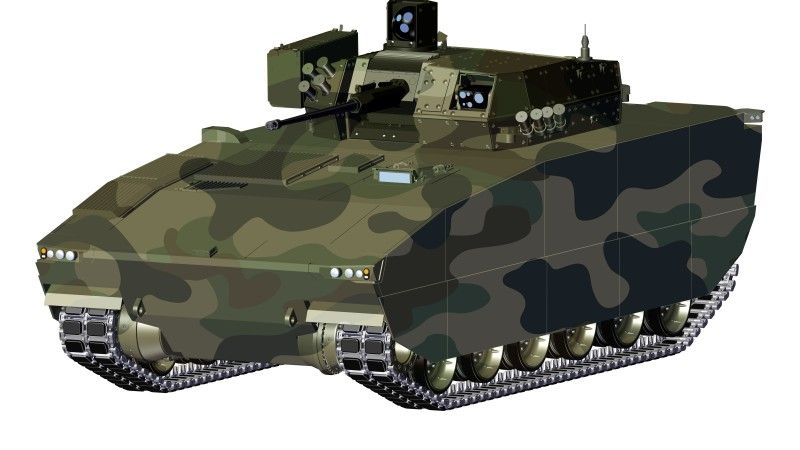Industry
Poland: Work on the Heavy IFV Platform Delayed

Photo. Armament Agency
Heavy Infantry Fighting Vehicle Demonstrator will not be rolled out this year, contrary to the previously released information, Defence24.pl found out. The vehicle configuration arrangements are still to be finalized.
Heavy Infantry Fighting Vehicle is to act as a complementary asset alongside the lighter, amphibious Borsuk IFV. Sebastian Chwałek, President of the PGZ Group, speaking to Defence24.pl in September said that PGZ would be willing to present the CBWP (HIFV) technology demonstrator before the end of the year. That will not happen.
“By the end of the year, we will showcase a technology demonstrator, as it cannot be referred to as a prototype yet, since we need to discuss all parameters and expectations expressed by the Polish Armed Forces. We will showcase how we see that design, and what we could offer to the military. I think that the Armed Forces see already some kind of a defined shape of this design, along with the Armament Agency. Largely I am under an impression that we agree when it comes to the assumptions that we all defined for this project”, President of the PGZ Group, Sebastian Chwałek told us.
According to information that Defence24 received from the PGZ Group, negotiation is currently underway with the Armament Agency, on the provisions of the performance agreement, and that very agreement would also include a schedule for the project implementation.
As stressed by Jacek Matuszak of the PGZ’s Communications and Marketing Department, for work on the CBWP demonstrator to begin, the Ordering Party needs to approve the earlier stage of the project, describing how the CBWP platform would be built. There is little time left this year, thus creating a technology demonstrator by the end of 2023 would not be possible.
The timeline of the project is one of the negotiation points. According to the assumptions adopted for further stages of the project, any tangible work would be preceded by the Ordering Party’s approval regarding the execution of the CBWP design. Given the fact that less than a month remains until the end of the year, the demonstrator will not be presented within that term.
@ Jacek Matuszak, PGZ Communications and Marketing Department
When it comes to the deliveries, the Polish Armed Forces would first receive 4 vehicles that will probably be used for test purposes (analogously as it happens in the case of the Borsuk IFV). The further lots would be covered by further performance agreements.
What is relevant is the fact that the PGZ Group intends to begin preparation of series manufacturing and delivery of larger lots when the first series of 4 vehicles is prepared, so that further deliveries can progress at as rapid a pace as feasible.
Because CBWP is expected to be based on the Krab/K9 platform, in-depth modifications would be required, both within the scope of mine/IED protection and ballistic protection levels as well. The base platform will need to be tailored to carry a crew of 3, along with a mechanized infantry squad. This would entail quite relevant changes in the hull design and the hull interior. The chassis will also be fitted with new, additional systems.
The PGZ representative stresses the fact, that the ZSSW-30 turret module constitutes “a comprehensive solution” that can be used on Rosomak APC, Borsuk IFV, and CBWP, in the current form, and after modifications requested by the Ordering Party. “It is one of the priorities to unify the systems between these vehicles”, he added. Should the Ordering Party express a need as such, changes will be possible.
PGZ does take into account a scenario in which CBWP orders are placed with different weapons and chassis configurations, however, at the current stage, it is an intent of our consortium (PGZ and HSW), to meet all expectations of the Polish Armed Forces, for the developed vehicle, without a necessity to use substitute solutions
@ Jacek Matuszak, PGZ Communications and Marketing Department
Responding to a question regarding a possible, rapid-implementation, simplified CBWP configuration, PGZ states that at the present stage, the consortium assumes that all expectations of the Polish Armed Forces would be met by a single configuration of the Heavy IFV. The Group does admit that delivering the vehicles in different weapons and platform configurations may also be doable.
When it comes to the actual manufacturing capacity for the CBWP project, that very capacity would be synced with the procurement volume. Decisions on which companies would be involved in the manufacturing would depend on the adopted timeline and the volume of CBWP deliveries expected by the Polish Armed Forces.
The framework agreement on delivery of the heavy IFV platform for the Polish Army was signed in August this year. The plan to procure such a vehicle at HSW had been first mentioned by the Head of the Polish Ministry of Defence, Mariusz Błaszczak in late February, when the framework agreement regarding the Borsuk IFV was concluded. The assumption is that the new, heavy IFV would be capitalizing on already existing solutions, including the ZSSW-30 turret and Krab base platform.
Undoubtedly, serious changes will be required for the base platform, to attain the complete capabilities. Probably, the know-how gathered during the Borsuk project regarding IED/mine protection may also turn out to be useful. On the other hand, any delays in the programme mean that the M1 Abrams elements will not receive the support of IFVs of proper mobility and firepower, as the Abrams brigades would be the first to receive the new CBWP platforms. That may, in turn, have a detrimental impact on the combat potential of those units, until the new platform is commissioned.
Hence the question, regarding the plausible use of a simpler configuration of the heavy IFV platform, made out of existing elements, after limited modifications. That configuration would render the baseline capabilities, and then it could become a core of the reserve forces inventory. Let us add that following the donation of the BWP-1 vehicles for Ukraine, the mechanized component is facing dire circumstances (the situation is worse than the one experienced by the MBT units). The performance contract regarding the Borsuk IFVs that are to be received by the 16th Mechanized Division first (receiving the K2 MBTs) has not been signed either.
Damian Ratka, Jakub Palowski
